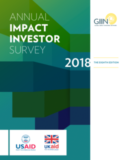The Global Impact Investing Network (GIIN) published the eighth edition of its Annual Impact Investor Survey, the most comprehensive collection and assessment of data on the global impact investing market. Comprising data and insights from 229 of the world’s leading impact investors, the report provides in-depth analysis of market activity and trends, covering topics such as: capital allocations by sector and geography, indicators of market development and industry challenges, approaches to impact measurement and management, and financial and impact performance. Additionally, for the first time, this year’s report includes a five-year trends analysis of growth and changes in the industry. Respondents collectively manage over USD 228 billion in impact investing assets, a figure which serves as the latest best-available ‘floor’ for the size of the impact investing market.
Amit Bouri, CEO and co-founder of the GIIN, said, “To realize the GIIN’s vision for the future of financial markets, where impact is integrated into all investment decisions, impact investing must continue to grow and build on its success of the past decade.” He added, “The Annual Survey demonstrates there is significant momentum in the market and provides data and insights for investors to maximize their impact and ultimately tackle critical global issues such as access to education and healthcare, gender inequality, poverty, climate change, and more.”
Some key findings from this year’s survey report include:
- The impact investing industry is growing. Over half of the investors surveyed made their first impact investment in the last ten years, showing that there are many new entrants to the market. In 2017, respondents invested over USD 35 billion into over 11,000 deals, and indicated plans to increase capital invested by 8% in 2018.
- The impact investing market is diverse. Top sectors to which respondents have allocated capital are financial services, energy, and microfinance. While allocations have grown across all sectors and geographies over the past five years (at a robust rate of 13% per annum overall), growth has been particularly strong in segments that historically accounted for a smaller share of investments – such as education and food & agriculture in terms of sectors and Oceania and East & Southeast Asia in terms of geographies – thus indicating expansion in investor interests.
- Overwhelmingly, impact investors report performance in line with both financial and impact expectations. A majority of respondents indicated that their investments have met or exceeded their expectations for impact (97%) and financial (91%) performance.
- Impact investors demonstrate a strong commitment to measuring and managing impact. Nearly all respondents measure the social and/or environmental performance of their impact investments. They use a mix of proprietary metrics, qualitative information, the GIIN’s IRISaligned metrics, and other tools and frameworks. The majority of respondents (76%) set impact targets for some or all of their investments to track progress toward their social/environmental goals.
- Investors are committed to the United Nations Sustainable Development Goals (SDGs). Many investors are recognizing the power of their capital to help achieve the SDGs. 76% of impact investors track their investment performance to the SDGs or plan to do so in the future.
- Impact investors note that there are remaining challenges that need to be addressed as the industry continues to grow. The most commonly cited challenges facing the growth of the impact investing industry are: the ‘lack of appropriate capital across the risk/return spectrum’ and the ‘lack of common understanding of the definitions and segments of the market.’
“In order to address many of the world’s most pressing social and environmental challenges, we need more investors entering the market and more capital flowing into impact deals,” said Abhilash Mudaliar, Director of Research at the GIIN. He added, “It is invigorating to present evidence through this year’s Annual Impact Investor Survey that demonstrates that not only is this growth happening but also that investors are reporting strong results on both financial and impact performance.”
The report findings are based on survey responses from fund managers, banks, foundations, development finance institutions, pension funds, insurance companies, and family offices.
This report is made possible by the support of the American People through the United States Agency for International Development (USAID). The contents of this report are the sole responsibility of the Global Impact Investing Network (GIIN) and do not necessarily reflect the views of USAID or the United States Government. The report was also produced with the support of the British people through the Department for International Development’s Impact Programme (DFID). The contents of this report do not necessarily reflect the views of DFID or the British Government.
Download the full report (pdf)




